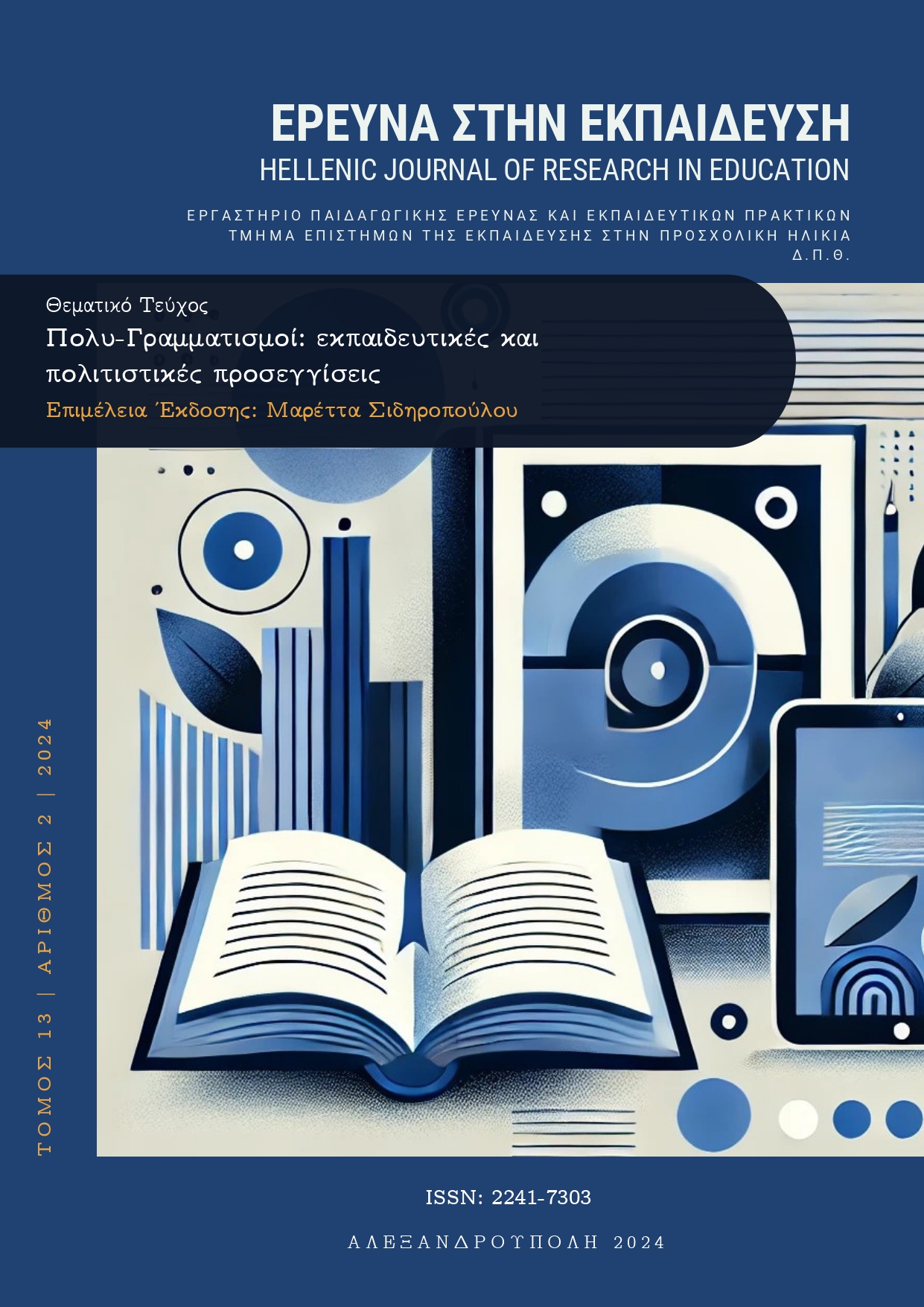Απόψεις Παιδαγωγών Πρώιμης Παιδικής Ηλικίας για τον Πολιτισμικό Γραμματισμό και τις Παιδαγωγικές Πρακτικές

Περίληψη
Στις μέρες μας, ο πολιτισμικός γραμματισμός, δηλαδή η ικανότητα κατανόησης και εκτίμησης της πολυπλοκότητας των διαφορετικών πολιτισμών αποτελεί αναπόσπαστο κομμάτι για την ευημερία όλων των σύγχρονων κοινωνιών. Στο πλαίσιο αυτό, αναγνωρίζεται όλο και περισσότερο η σημασία του ως απαραίτητο συστατικό της αγωγής των μικρών παιδιών, καθώς συμβάλλει στην καλλιέργεια συμπεριληπτικών και ενσυναισθητικών αξιών και στάσεων. Για τον λόγο αυτό, οι παιδαγωγοί που εργάζονται σε δομές αγωγής και φροντίδας στην πρώιμη παιδική ηλικία, θα πρέπει να φροντίζουν όχι μόνο για τη μετάδοση γνώσεων στα παιδιά σχετικά με τους διαφορετικούς πολιτισμούς, αλλά και για την διαμόρφωση ολόκληρης της κοσμοθεωρίας τους, αφού βρίσκονται σε ένα κρίσιμο αναπτυξιακό στάδιο κατά το οποίο διαμορφώνονται θεμελιώδεις αξίες και στάσεις. Λαμβάνοντας υπόψη τα παραπάνω, η παρούσα εργασία αποσκοπεί στη διερεύνηση του τρόπου με τον οποίο οι παιδαγωγοί αντιλαμβάνονται τον πολιτισμικό γραμματισμό και τον ενσωματώνουν στην παιδαγωγική διαδικασία. Για την επίτευξη του σκοπού αυτού, κατασκευάστηκε ένα ερωτηματολόγιο που απευθυνόταν σε παιδαγωγούς πρώιμης παιδικής ηλικίας και συνδύαζε την ποσοτική (κλειστού τύπου ερωτήσεις και ερωτήσεις τύπου Likert) και την ποιοτική ανάλυση (ανοιχτού τύπου ερωτήσεις). Τα δεδομένα που συλλέχθηκαν αναλύθηκαν με τη χρήση του SPSS για τα ποσοτικά στοιχεία και της θεματικής ανάλυσης για τα ποιοτικά. Τα ευρήματα της μελέτης, προσφέρουν πολύτιμες γνώσεις για τους υπεύθυνους χάραξης πολιτικής και τους παιδαγωγούς, τονίζοντας τη σημασία του πολιτισμικού γραμματισμού στην ανάπτυξη μιας πιο περιεκτικής και πολιτισμικά ευαισθητοποιημένης γενιάς παιδιών, ενώ παράλληλα αναδεικνύουν τις παιδαγωγικές πρακτικές που εφαρμόζονται στις δομές αγωγής και φροντίδας για την καλλιέργειά της.
Λεπτομέρειες άρθρου
- Πώς να δημιουργήσετε Αναφορές
-
Σωτηροπούλου Ε. (2024). Απόψεις Παιδαγωγών Πρώιμης Παιδικής Ηλικίας για τον Πολιτισμικό Γραμματισμό και τις Παιδαγωγικές Πρακτικές. Έρευνα στην Εκπαίδευση, 13(2), 50–72. https://doi.org/10.12681/hjre.37361
- Ενότητα
- Άρθρα

Αυτή η εργασία είναι αδειοδοτημένη υπό το CC Αναφορά Δημιουργού – Μη Εμπορική Χρήση – Παρόμοια Διανομή 4.0.
Τα πνευματικά δικαιώματα των άρθρων του περιοδικού ανήκουν στους συγγραφείς. Τα άρθρα διατίθενται με άδειες Creative Commons CC-BC-SA 4.0


